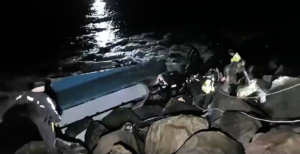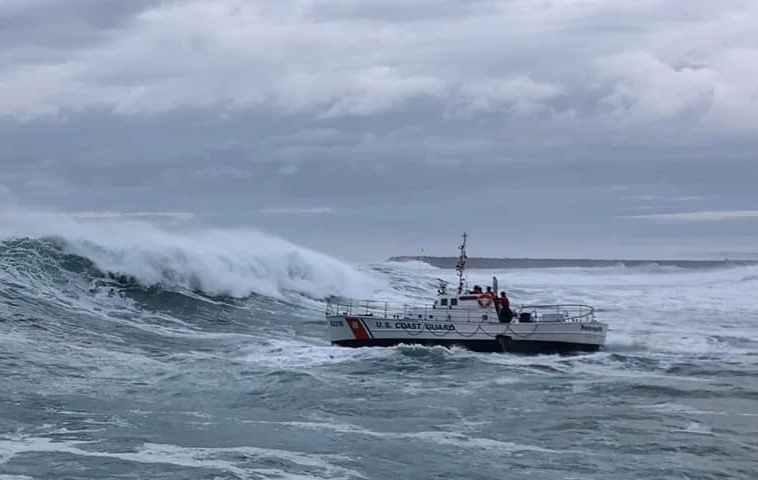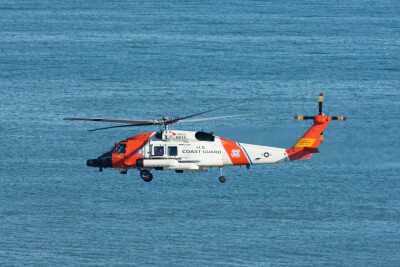After the near-loss of three fishermen when their vessel capsized at Coos Bay, Ore., the Coast Guard is stressing the danger of crossing the bars of Northwest waterways in heavy weather and at night.

The first crewman to emerge from the overturned Pacific Miner reaches the top of a Coos Bay jetty after firefighters sawed a hole in the hull. Video still courtesy Basin Tackle Charleston.
“Recent incidents have highlighted the challenges of attempting to cross waterway bars in heavy weather and at night. The marine casualty of a commercial fishing vessel on the Coos Bay bar resulted in the loss of a vessel, but miraculously all three crew members were saved,” according to a statement from the Coast Guard 13th District public affairs unit in Astoria, Ore. “Unfortunately, in a similar incident on the Yaquina Bay bar, both the crew and the vessel were tragically lost.”
The Coast Guard regulates specific navigation areas along the Oregon and Washington coasts, and publishes guidance for mariners on how to safely transit those waterways. When conditions become too hazardous, the Coast Guard’s captain of the port in that sector – referred to as the COTP in Coast Guard bulletins – has authority to restrict or close vessel traffic over bars.
Those measures are imposed based on how the Coast Guard assesses dangers.
Bar closure: when the captain of the port determines that sea state and other environmental conditions exceed operational limits of Coast Guard search and rescue units, the bar will be closed. No vessels may cross the bar unless specifically exempted by the COTP.
Restricted bar: the captain of the port can restrict a bar for vessels of specified length, including recreational and uninspected passenger vessels.
Bar operations at night: the Coast Guard typically reports bar conditions from first light to last light, meaning bar reports become outdated as conditions change at night. Vessel operators should exercise extreme caution when transiting a restricted bar between sunset to sunrise. If there is any doubt as to conditions on the bar, vessel masters should consider staying outside in deep water until updated conditions can be determined. When the bar is restricted to vessels of a specified length, masters of commercial fishing vessels up to and including that length, must contact the Coast Guard on VHF-FM channel 16 or 22A prior to crossing the bar and report their vessel's name, location or position, the number of persons aboard and destination.
Rough bar escorts: at times the Coast Guard may determine that the safest option is to escort vessels across a hazardous bar. While the variability of each bar and given conditions requires flexibility in how the Coast Guard will undertake an escort, typically two Coast Guard motor life boats will be on scene. Guidance from the on-scene Coast Guard units is always advisory in nature; at no time are vessel masters relieved of their responsibility for the safe operation and navigation of their vessel.
Bar reporting and guidance: the Coast Guard has established guidance on the Northwest regulated navigation areas. Those guidance documents can be found online. Go to http://www.fishsafewest.info/Regs.asp and open the “Bar Crossing Guidance” folder.
Public outreach: vessel masters unfamiliar with local bar conditions, bar reporting methods or Coast Guard escort techniques are strongly encouraged to contact their local Coast Guard station. Commanding officers and officers-in-charge of local stations can provide an overview of their bar reporting areas and discuss in detail how their unit will conduct rough bar escorts.
Mariners can view daily bar status reports online at weather.gov/pqr/AllBars
For more information on monitoring bar conditions and safe passage, contact Dan Hardin, commercial fishing vessel safety program coordinator for the Coast Guard 13th District, at (206) 220-7226.







